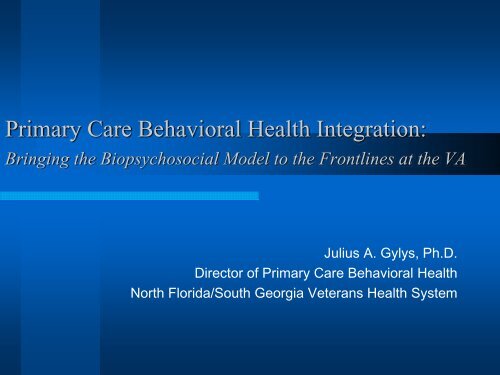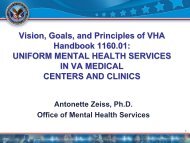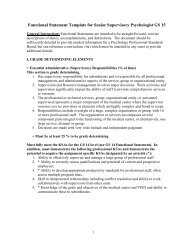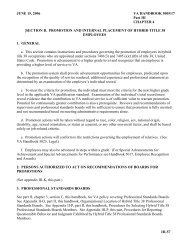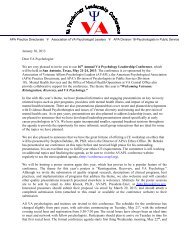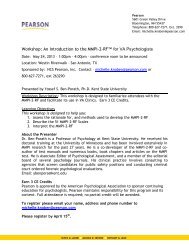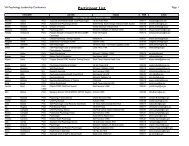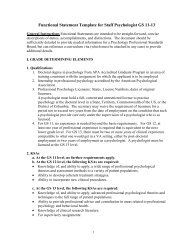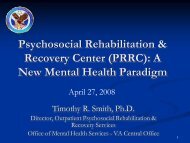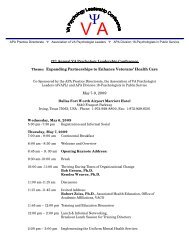Julius Gylys, Ph.D., Director of Primary Care Behavioral Health, N ...
Julius Gylys, Ph.D., Director of Primary Care Behavioral Health, N ...
Julius Gylys, Ph.D., Director of Primary Care Behavioral Health, N ...
Create successful ePaper yourself
Turn your PDF publications into a flip-book with our unique Google optimized e-Paper software.
<strong>Primary</strong> <strong>Care</strong> <strong>Behavioral</strong> <strong>Health</strong> Integration:<br />
Bringing the Biopsychosocial Model to the Frontlines at the VA<br />
<strong>Julius</strong> A. <strong>Gylys</strong>, <strong>Ph</strong>.D.<br />
<strong>Director</strong> <strong>of</strong> <strong>Primary</strong> <strong>Care</strong> <strong>Behavioral</strong> <strong>Health</strong><br />
North Florida/South Georgia Veterans <strong>Health</strong> System
Acknowledgments<br />
• AVAPL Conference Committee<br />
• VA Office <strong>of</strong> Mental <strong>Health</strong><br />
• WRJ and BHL Sites<br />
• PCBH Team at NF/SG VHS<br />
• Psychology Leadership at NF/SG
Overview<br />
• <strong>Primary</strong> <strong>Care</strong> <strong>Behavioral</strong> <strong>Health</strong> Integration<br />
• The Veterans Affairs OMH Initiative<br />
• NF/SG adaptation <strong>of</strong> the WRJ Model<br />
• Detroit adaptation <strong>of</strong> the BHL
Integrated <strong>Care</strong> Explained<br />
IN<br />
OUT<br />
Psychological<br />
Biological<br />
Social<br />
Biopsychosocial Model<br />
René Descartes<br />
Mind-Body Dualism
VA Integrated <strong>Care</strong> Initiative<br />
2006<br />
• Apr: AVAPL - PCMHI is coming!<br />
• May: VACO issues RFP<br />
• Jun: VISN & VACO deadlines<br />
• Dec: VACO awards programs
VA Integrated <strong>Care</strong> Initiative<br />
2007<br />
• Recruitment and planning<br />
• June PC Integration Denver Conference<br />
• Monthly conference calls<br />
• Training and site visits<br />
• Integrating new staff into medical center<br />
• Program development and launch
<strong>Primary</strong> <strong>Care</strong>-Mental <strong>Health</strong><br />
Integration Initiative<br />
• 92 integrated care programs<br />
• $32 million in FY08 funding<br />
• 409 FTE positions<br />
• Diverse models <strong>of</strong> care<br />
• Edward Post, MD, <strong>Ph</strong>D - NMD
Types <strong>of</strong> Integrated <strong>Care</strong> Models<br />
• Co-located Collaborative <strong>Care</strong><br />
(White River Junction)<br />
• <strong>Care</strong> Management<br />
(Behavior <strong>Health</strong> Lab, TIDES)<br />
• Blended Models
White River Junction Model<br />
• A service delivery model<br />
• Co-located and collaborative<br />
• On-demand care<br />
• Evidenced-based<br />
• Objective intake and outcome measures<br />
• Innovative use <strong>of</strong> technology<br />
• Customizable for diverse needs & resources
PC at North FL/South GA VHS
<strong>Primary</strong> <strong>Care</strong> at NF/SG VHS<br />
Gainesville<br />
• 20,000 PC Veterans<br />
• Rural county<br />
• 20 PCPs<br />
• 4 General clinics<br />
• Women’s and<br />
Specialty PC<br />
• ACOS = ‘Champion’<br />
Lake City<br />
• 12,000 PC Veterans<br />
• More rural county<br />
• 11 PCPs<br />
• 2 General clinics<br />
• Women’s and<br />
Specialty PC<br />
• AD = ‘Champion’
PC <strong>Behavioral</strong> <strong>Health</strong> Teams<br />
Gainesville<br />
• Program <strong>Director</strong><br />
• 4 Psychologists<br />
Lake City<br />
• 2 Psychologists<br />
• 1 Psychiatrist
Goals for PCIBH<br />
Improved Access to <strong>Care</strong><br />
• Bring services to where the patients are<br />
• De-stigmatize Mental <strong>Health</strong>care<br />
• Decrease wait times and missed appointments<br />
• Decrease specialty care wait time<br />
• Increase specialty care follow-through
Goals for PCIBH<br />
Improved Quality <strong>of</strong> <strong>Care</strong><br />
• Early detection and treatment <strong>of</strong> problems<br />
• Collaborate with primary care team<br />
• Capitalize on “motivated moments”<br />
• Increased likelihood that evaluation occurs<br />
• Empirically based evaluation and treatment
PC <strong>Behavioral</strong> <strong>Health</strong> at NF/SG<br />
•Exploration <strong>of</strong> BHL<br />
•Adaptation <strong>of</strong> WRJ Model<br />
•Co-located (actual and virtual)<br />
•Collaborative<br />
•On (PCP) demand<br />
•Doctorate level providers
<strong>Primary</strong> Problems Targeted<br />
• Depression*<br />
• PTSD*<br />
• Alcohol Misuse<br />
• Dementia
Other Common Problems Addressed<br />
• Grief<br />
• Insomnia*<br />
• Adjustment and coping<br />
• Stress management-relaxation training*<br />
• Pain management*<br />
• <strong>Health</strong> behavior change*
Common Modes for Referral<br />
• Real Time “Warm Hand<strong>of</strong>f”<br />
(knock, phone, page)<br />
• CPRS Electronic Consult/Addendum<br />
• Within Team Referral
PCBH Patient Flow<br />
<strong>Primary</strong> <strong>Care</strong> Clinics<br />
Urgent <strong>Care</strong> Clinic<br />
Specialty Clinics<br />
PC <strong>Behavioral</strong><br />
<strong>Health</strong> Team<br />
Patient Advocate Office<br />
PC <strong>Behavioral</strong> <strong>Health</strong> Evaluation<br />
(Real Time or Scheduled)<br />
Feedback &Treatment<br />
Planning with PCP<br />
PCBH<br />
Group<br />
Brief<br />
Individual<br />
Referral or <strong>Care</strong><br />
Management<br />
<strong>Primary</strong> <strong>Care</strong><br />
Monitoring
Patients Seen by PCBH Monthly<br />
PCBH Monthly Productivity 2007-2008<br />
500<br />
450<br />
400<br />
350<br />
300<br />
250<br />
200<br />
150<br />
100<br />
50<br />
0<br />
Sep Oct Nov Dec Jan Feb Mar<br />
Encounters<br />
Uniques
Patients Seen by PCBH Cumulative<br />
PCBH Cumulative Productivity 2007-2008<br />
2500<br />
2000<br />
1500<br />
1000<br />
Encounters<br />
500<br />
0<br />
Sep Oct Nov Dec Jan Feb Mar
Initial Evaluations<br />
• At time <strong>of</strong> proposal in 2006, approximately<br />
65% <strong>of</strong> MHC referrals were evaluated<br />
50% <strong>of</strong> PTSD referrals were evaluated<br />
45% <strong>of</strong> SA referrals were evaluated<br />
0% were being seen on same day basis<br />
• Jan-Mar 2008<br />
45% <strong>of</strong> referrals were seen on an immediate basis<br />
90% <strong>of</strong> referrals were evaluated
Decreased use <strong>of</strong> SC as first response<br />
• PTSD Clinic Team Consults<br />
• Neuropsychology Dementia Consults<br />
• Mental <strong>Health</strong> Clinic Psychiatry Consult<br />
• Substance Abuse Treatment Team*
Hurdles<br />
• Space matters<br />
• CPRS clinical reminders<br />
• <strong>Primary</strong> <strong>Care</strong> Culture<br />
• Integration into Psychology<br />
• Collaborating with MHC<br />
• Balancing boundaries<br />
• Clerical support<br />
• Acceptance <strong>of</strong> the process
Future Directions<br />
• Evaluation <strong>of</strong> program<br />
• Keeping things fresh e.g. PCBH newsletter<br />
• Referral growth edges e.g. OEF/OIF, UC, DTC<br />
• Targeted problems growth edges<br />
e.g. insomnia, diabetes and blood pressure<br />
clinics, pain management, cancer survivorship<br />
and caregivers, post transplant<br />
• Spread the word with conference presentations<br />
& networking


